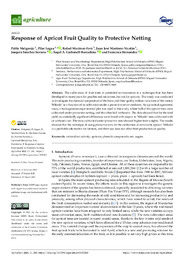Por favor, use este identificador para citar o enlazar este ítem:
https://hdl.handle.net/11000/34297
Response of Apricot Fruit Quality to Protective Netting
Título :
Response of Apricot Fruit Quality to Protective Netting |
Autor :
Melgarejo Moreno, Pablo 
Legua, Pilar 
Martínez Font, Rafael
Martinez Nicolas, Juan Jose 
Sanchez-Soriano, Joaquin 
Carbonell-Barrachina, Ángel A.
Hernández, Francisca |
Editor :
MDPI |
Departamento:
Departamentos de la UMH::Producción Vegetal y Microbiología |
Fecha de publicación:
2021-03-19 |
URI :
https://hdl.handle.net/11000/34297 |
Resumen :
The cultivation of fruit trees in protected environments is a technique that has been developed in recent years for peaches and nectarines, but not for apricots. This study was conducted to investigate the chemical composition of the fruits and their quality indices variations of the variety ‘Mikado’ as a function of its cultivation under a protective net or outdoors. As a practical agronomic assay, a homogeneous experimental plot was used in this study, where half of the apricot trees were cultivated under protective netting, and the other half without it. The data showed that for the total yield, no statistically significant differences were found with respect to ‘Mikado’ trees cultivated with or without a net. The trees cultivated under protective nets showed higher fruit weights. The results showed that the technique of using protective nets for the cultivation of extra-early apricot ‘Mikado’ is a profitable alternative for farmers, and their use does not affect fruit production or quality
|
Palabras clave/Materias:
Antioxidant activity
Apricots
Phenolic compounds
Net
Sugars |
Tipo de documento :
info:eu-repo/semantics/article |
Derechos de acceso:
info:eu-repo/semantics/openAccess
Attribution-NonCommercial-NoDerivatives 4.0 Internacional |
DOI :
https://doi.org/10.3390/agriculture11030260 |
Publicado en:
Agriculture 2021, 11(3), 260 |
Aparece en las colecciones:
Artículos - Producción vegetal y microbiología
|
 La licencia se describe como: Atribución-NonComercial-NoDerivada 4.0 Internacional.
La licencia se describe como: Atribución-NonComercial-NoDerivada 4.0 Internacional.
 La licencia se describe como: Atribución-NonComercial-NoDerivada 4.0 Internacional.
La licencia se describe como: Atribución-NonComercial-NoDerivada 4.0 Internacional.
.png)
